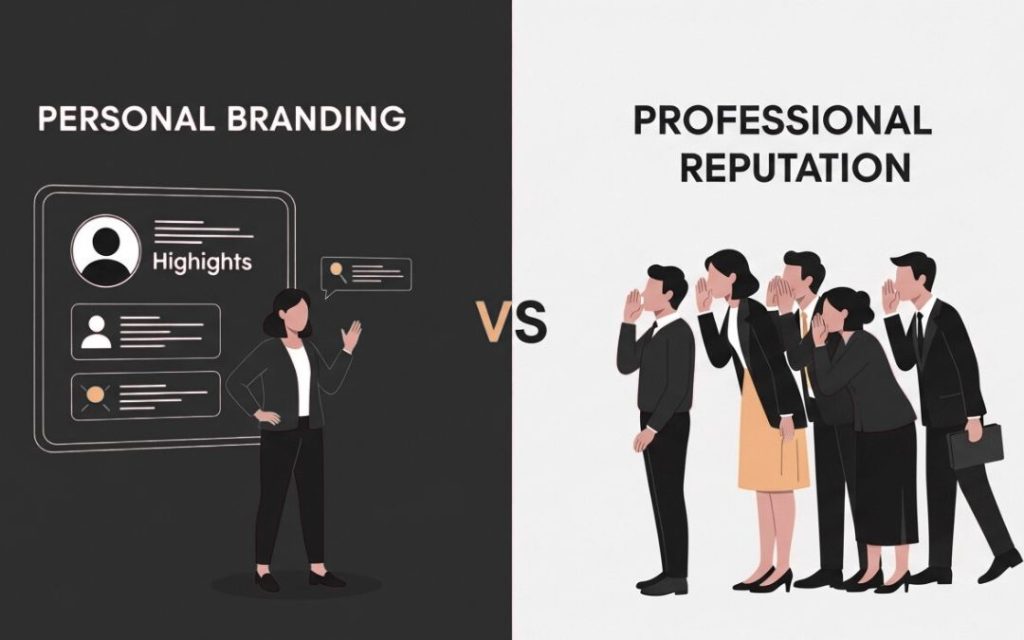How Personal Branding and Professional Reputation Shape Your Success
In today’s hyper-connected world, conversations about career growth, credibility, and influence often revolve around two powerful concepts: personal branding and professional reputation. Many people use these terms interchangeably, but while they’re deeply connected, they are not the same thing. Understanding the difference between the two can mean the difference between a career that simply survives—and one that thrives with influence, opportunities, and authority.
Think about it this way: your professional reputation is what others say about you when you’re not in the room. Your personal brand, however, is the narrative you actively create, control, and amplify in that room—and beyond.
Let’s dive deeper to uncover why this distinction matters, especially in 2025 where competition is fierce, AI-driven visibility is reshaping industries, and professionals can no longer afford to leave their brand to chance.
Personal Branding vs Professional Reputation: Defining the Terms
Professional reputation is reactive. It forms naturally over time through your actions, behaviors, and results in professional settings. For example, if colleagues describe you as reliable, detail-oriented, or a great team leader, that’s your professional reputation.
Personal branding, on the other hand, is proactive. It’s the intentional process of shaping how you want to be perceived by your peers, your audience, or even the wider world. This includes your online presence, your storytelling, the content you create, and the way you position your expertise.
In short:
- Professional reputation = earned through actions.
- Personal brand = built through intentional visibility.
Both are valuable, but only one gives you the power to steer the narrative.
The Overlap Between Branding and Reputation
It’s not an either/or situation. Your professional reputation is the foundation; your personal brand is the amplifier. You may have an excellent reputation in your office, but without building a personal brand, your influence might never extend beyond those walls. Conversely, a strong personal brand without a solid reputation behind it is shallow—it won’t stand the test of time.
Case in point: Consider Satya Nadella, CEO of Microsoft. His reputation as a visionary leader is undeniable, but his personal brand as a compassionate, empathetic, and inclusive innovator amplified his leadership far beyond corporate boardrooms. His success lies at the intersection of both.

The Hidden Costs of Relying Only on Reputation
Relying solely on your professional reputation has hidden costs:
- Limited Visibility: You may be respected in your company but invisible in the wider industry.
- Missed Opportunities: Speaking engagements, collaborations, and partnerships often go to those with recognizable personal brands.
- Career Stagnation: Without proactive branding, others control the narrative about your work.
- No Digital Footprint: In 2025, recruiters and clients Google you before they meet you. If they find nothing compelling, you may lose out without ever knowing.
A survey by LinkedIn found that 70% of employers research candidates online before hiring. If all they find are generic results or outdated information, your reputation—even if great—won’t translate into career momentum.
Personal Branding in Action: Real Success Stories
Take Gary Vaynerchuk. His professional reputation started in his family’s wine business. But by actively building a personal brand online—through YouTube videos, podcasts, and social media—he transformed himself into a global entrepreneur and thought leader. His reputation gave him credibility, but his personal brand made him a household name.
Another example is Brené Brown, a professor and researcher. Her professional reputation was built in academia, but her personal brand—crafted through TED Talks, books, and podcasts—turned her into a global authority on vulnerability and leadership.
Both prove that while reputation opens doors, personal branding ensures the world knows which doors you’ve walked through.
Common Mistakes Professionals Make
- Believing reputation alone is enough in the digital age.
- Ignoring personal branding because it feels “self-promotional.”
- Having inconsistent messaging across platforms (LinkedIn vs Twitter vs in-person).
- Not showcasing achievements publicly out of fear of judgment.
- Over-focusing on technical expertise without sharing the story behind the expertise.
Future Trends: Why Personal Branding Will Matter Even More
By 2030, AI-driven hiring and business decision-making will rely heavily on digital footprints. Companies are already using tools that analyze online presence, thought leadership, and influence to evaluate candidates and collaborators.
According to a study by Edelman Trust Barometer, 65% of people trust thought leaders with strong personal brands over traditional advertising. That means your brand won’t just affect your job opportunities—it will influence trust, credibility, and even consumer behavior.
Expect personal branding to become as essential as your résumé. In fact, your digital presence might replace your résumé.
FAQs About Personal Branding vs Professional Reputation
1. What is the difference between personal branding and professional reputation?
Personal branding is intentional storytelling and positioning; professional reputation is the perception others form through your actions.
2. Which is more important for career growth?
Both matter, but personal branding amplifies your reputation and extends its reach.
3. Can I have a personal brand without a professional reputation?
Yes, but it’s not sustainable. A weak reputation will eventually damage your brand.
4. Why does personal branding matter in 2025?
Because visibility, trust, and influence are increasingly tied to online presence and content.
5. How can I start building my personal brand?
Define your unique value, create consistent messaging, and share insights through content and networking.
6. What if I don’t like self-promotion?
Think of personal branding as service, not promotion. You’re sharing knowledge to help others.
7. How do I protect my professional reputation while branding myself?
Stay authentic. Don’t make claims you can’t back with actions. Align your brand with your true strengths.
Conclusion: Building Both for Lasting Impact
Your professional reputation is what you earn; your personal brand is what you project. One is built passively through years of hard work, while the other is intentionally crafted to expand your influence.
In 2025, when industries are evolving at lightning speed and digital presence often outweighs résumés, professionals can no longer afford to separate the two. To truly thrive, you must actively build a personal brand that reflects and amplifies your professional reputation.
The world is already searching for you online—the question is: what do you want them to find?




